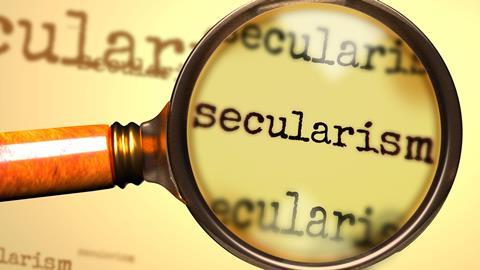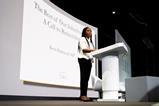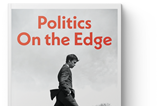Following headlines in national newspapers about Gen Z’s growing interest in church and the unapologetically Christian members of England men’s football team, Pat Finlow says the evidence is mounting that secular thinking is on its way out

Our society is increasingly secular. Belief in God is down. Christians are not respected in public life.
You’ve heard all of this before. Of course you have! So to suggest that secularism has had it’s day probably sound preposterous.
The recurring narrative that religion is on its way out has made it difficult to see the reality. The truth is there’s an emerging curiosity about faith, and a welcome shift in attitudes towards those of us who identify as believers.
Still not convinced? Let’s take a whistle-stop tour of a few examples:
The findings of a report commissioned by the All Party Parliamentary Group (APPG) on Faith and Society during the pandemic, showed a dramatic increase in the number of collaborations between local authorities and faith groups. These were seen as overwhelmingly positive, with 91 per cent of authorities describing these as ‘very positive’ or ‘positive’ and attesting to a new appreciation of the agility, flexibility and professionalism of the faith groups they worked with.
secularism is no longer the unchallenged, all pervasive framer of public discourse
Was this just a quirk of the covid era? No. A follow-up report showed the partnerships were not only flourishing but also extending to other areas, especially in supporting groups that were traditionally hard to reach. Other studies reached the same conclusion: there is a maturing understanding of faith-based social action and a growing appreciation of the impact their distinctiveness brings. As the Bishop of Manchester put it so vividly: “… we are not the fancy dress division of the voluntary sector.”
Another finding is that the shyness with which many faith groups had been operating is giving way to a new sense of confidence in speaking up about the issues they are dealing with. This is recognised by the Mayor of Greater Manchester, Andy Burnham, who has established an advisory panel to give faith communities a platform and an enhanced voice, explaining, that faith groups “have always played such a fundamental role in our communities – and they deserve a stronger voice. We should listen more and involve them more.” That this insight has reached the highest level was seen in the words of Sir Keir Starmer to this magazine: “I’m absolutely clear, that there will be no decade of national renewal without the active participation of the church.”
This increased confidence is also seen in sport and culture: several members of the English Football team speak openly of their faith and how this helps them deal with the pressures they face. Jasmine Jobson and Gbemisola Ikumelo, recent recipients of BAFTA TV awards, began their acceptance speeches by joyfully thanking God for his help in their lives.
The tone is changing
Faith pops up in other unexpected places: at Glastonbury, headliners Coldplay launched a new song, ‘And so we pray’; the National Gallery held an exhibition of the art and imagery of St Francis of Assisi because he is “…a figure of enormous importance to our time due to his spiritual radicalism, commitment to the poor and love of God and nature”; The Radio 4 programme ‘Start the Week’ featured a discussion on ‘Reading the Bible’ and another on ‘The War Between Science and Religion’ where the commonly held view that science had pushed faith to the margins was refuted.
The journalistic eye-roll is now often absent from mainstream media when faith is discussed: a Guardian editorial spoke of “…the social energy, passion and rootedness that make faith groups such an asset in so many communities.” and the tone of both The Telegraph and The Times have been informative and curious, even if a bit puzzled, when exploring the rise of faith among younger people.
I am not suggesting we are living in a post-secular world. There is still much to lament in our society and residual mistrust and antagonism to faith remains in many places. But secularism is no longer the unchallenged, all pervasive framer of public discourse.
Our response
How can we navigate this new cultural landscape where curiosity about faith is creating opportunities for Christians to speak up?
First, we need to scrap the outdated narrative of ‘the world becoming more secular’ as it acts as a straitjacket for many who fear they are still not welcome to participate in joint ventures or policy making fora.
Secondly, some excellent advice comes from the respondents to a consultation carried out by FaithAction. They spoke of their own responsibility to “be clear about what they offer and to be able to evidence it effectively to show what their value is and how much of a resource they can be to their local authority”.
I agree. The ball is now firmly in our court to respond.






































3 Readers' comments